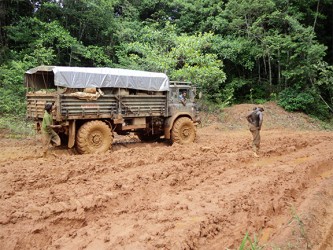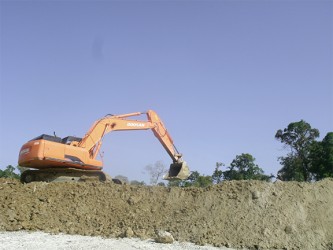As the local mining community contemplates the continual slide in the price of gold that resulted in the sector’s failure to reach its gold production target for the first time in several years, there are indications that recovery could hinge on other factors apart from an early hike in the gold price.
Information reaching this newspaper suggests that serious infrastructure challenges including continually deteriorating roads and water supply deficiencies in some mining areas could hinder the growth of the sector even in the event of an increase in gold price.
Moreover, the likelihood of an early alleviation of these problems is being hindered by the high costs associated with constructing new roads and bridges and repairing deteriorating ones and bureaucratic sloth arising out of the protocols and procedures associated with securing official approval to pursue projects.
Sub-standard roads and high costs associated with repairs and maintenance have been a sore point in the relationship between miners and the Guyana Geology and Mines Commission (GGMC) and during meetings of the Hinterland Roads Committee held earlier this year various options were mooted for improving the quality of infrastructure, particularly roads, in mining communities.

Meetings of the Hinterland Improvement Committee held earlier this year paid particular attention to the need to repair and renovate roads serving key mining communities including Mahdia, Port Kaituma, Itaballi and Puruni.
The preliminary estimate to asphalt the roads at Mahdia, Port Kaituma, and the Paruima to Itaballi corridor is $1 billion.
Stabroek Business understands that the GGMC is advocating that interior road repairs be prioritized and asphalted in sections in order to mitigate the high costs, other options including applying concrete to the surface of the roads were being explored.
Much of the cost associated with asphalting would be with regard to mobilizing one of the two lone asphalt plants in the country.
Resources apart, this newspaper understands that repairs to key roads in mining communities are hampered by bureaucratic sloth. In the instance of the Itaballi to Puruni road, while miners continue to protest what is said to be its deplorable condition, Stabroek Business understands that the commencement of remedial work has been held up on account of the contractor’s skepticism about moving ahead with the project in the absence of a signed contract despite receiving assurances from the GGMC Board Chairman.
Meetings between the miners and the Hinterland Improvement Committee have discussed the need for road contracts to extend for longer periods and to contain maintenance components since additional maintenance is frequently needed before and after each rainy season.
Discussions between miners and the Hinterland Improvement Committee have also addressed the issue of miners becoming more directly involved in road works in the locations where they are operating.
While the deliberations agreed that such a course of action was likely to commit miners to the proper maintenance of the roads, it was noted that the issue of charging a toll would give rise to the need for a Road Users Agreement.
Among the other mining-related matters that have been the subject of discussion at the level of the miners and the Hinterland Improvement Committee is the upgrading of the water supply system at Mahdia which is expected to cost around $80 million.

Meanwhile, local miners are likely to face other challenges in 2015 including high operation and maintenance costs, high rental costs for mineral properties, rising prices for spares and machinery, limited lands for mining, disparities in the granting of concessions to foreign and local miners, high fuel costs, violent crime in mining communities, sloth in the processing of work permits for Brazilian miners and largely impassable hinterland roads.
Meanwhile, sources in the industry have told Stabroek Business that over the past two years rising operating costs have seen the repossession by dealers of scores of excavators, resulting in the loss of more than 1,700 jobs in the sector. As the economic squeeze on the sector tightens further local miners continue to appeal to government for duty-free fuel, a 50 per cent reduction mineral properties’ rent, duty-free concessions on 4-door pickup trucks, an increase in the number of police outposts and patrols in mining areas, firearm licences for miners, the opening of more mineral-bearing areas, a clampdown on illegal shops and unlawful mining activities and improved access roads and bridges.




